Sharpen your search insights
Open your eyes to a new dimension of SERP analysis that isn’t focused on page ranking. To win in search, you’ve got to dominate the page one space. SERPsketch helps you discover the features your prospects see when they search for your brand or keywords.
Sign up for a 30-day free trial (no credit card required) and then get a 10% discount on any plan using OMGOFFER10.

Used by
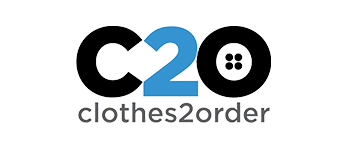


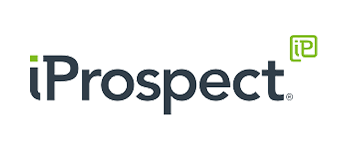



Quantify your share of page one SERPs
Open your eyes to a new dimension of SERP analysis that isn’t focused on ranking. SERPsketch gives you the insights you need to outperform your competition in all aspects of the Page One SERP. Whether you want to know exactly who you’re competing against or where you’re most visible to your customers, use SERPsketch to identify the best opportunities for your SEO/SEM strategy.
Visualise and quantify what a prospective customer would see in search
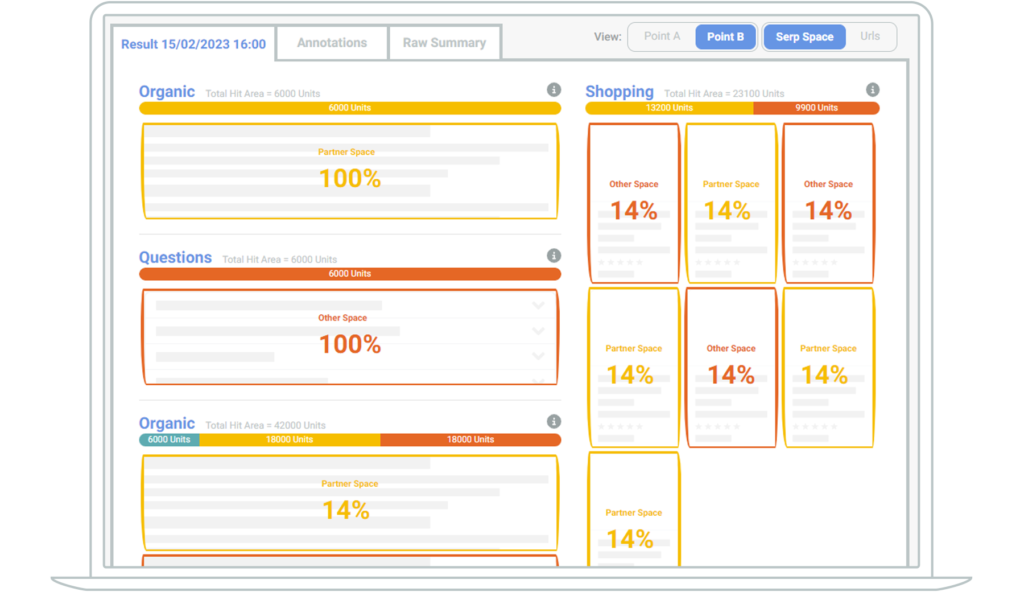
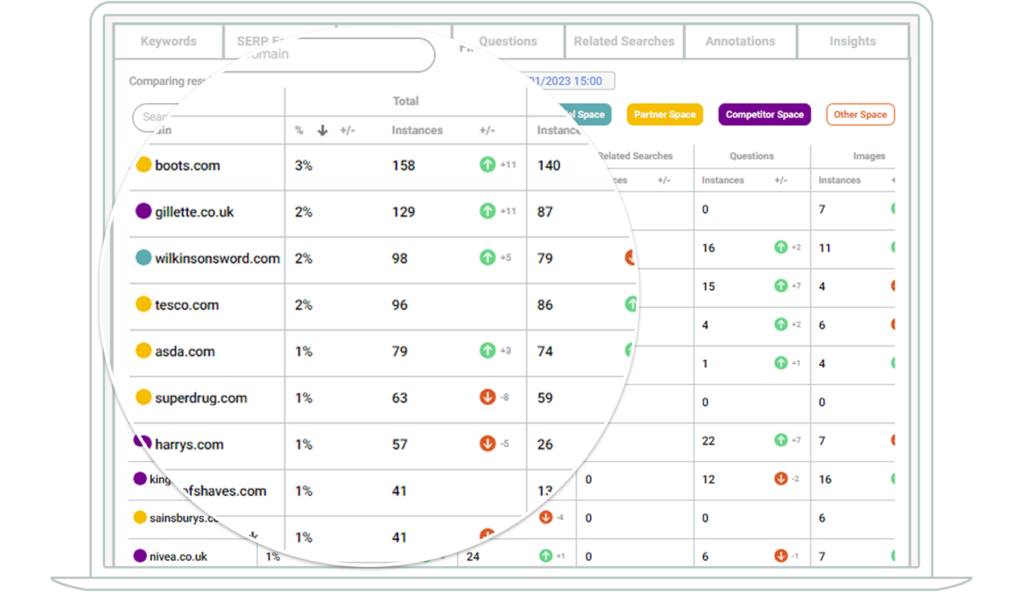
Know who you’re competing against, both at the keyword and topic cluster level
Find out who is competing against you and what you can do to outmanoeuvre them. Understand which of your competitors’ pages are appearing in the SERP.
With detailed insights you can avoid taking share of the SERP from partners – or even your own business – and make sure you’re focusing on winning space from your competitors.
Focus on the keywords that drive traffic to a site
Unlike traditional Search Visibility tools, SERPsketch focuses on the keywords (both PPC and organic) that drive traffic into a site, helping you to define where to invest and maximise your marketing efforts.
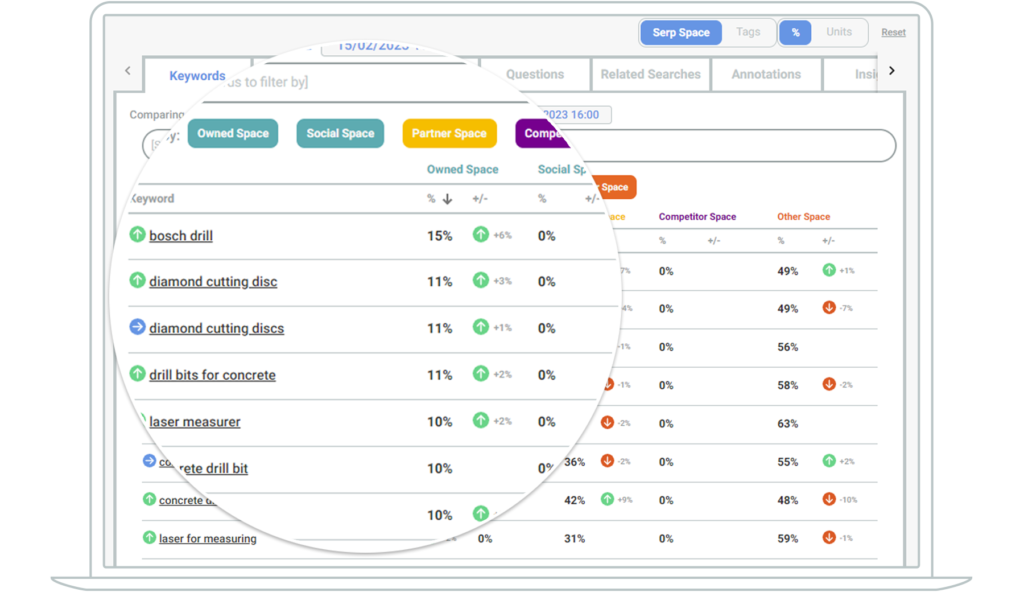
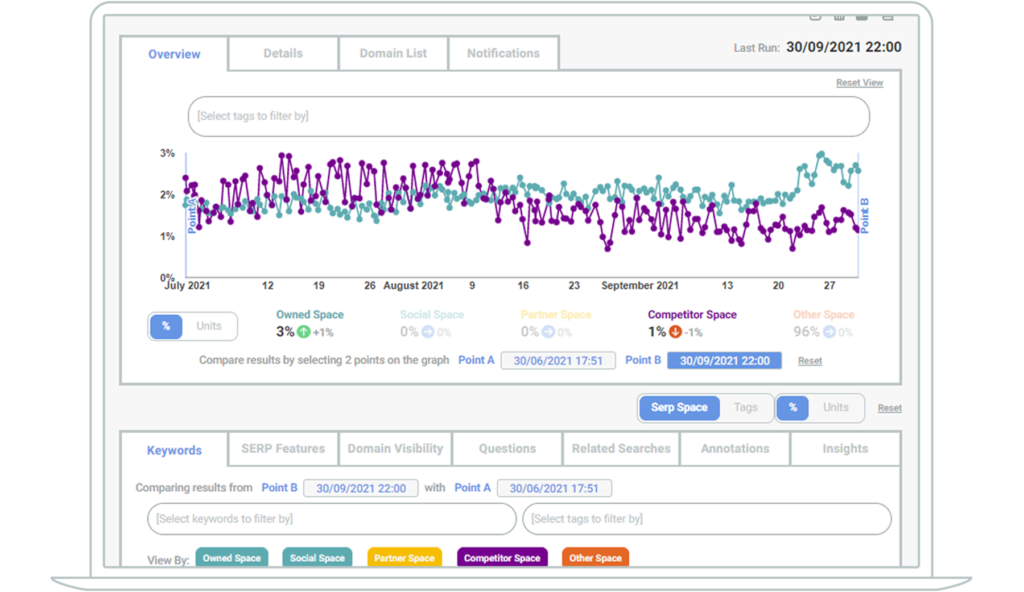
Track your share of page over time
By tracking sets of keywords over time, you monitor changes in your visibility, gain insights across multiple keyword groups to build a competitive strategy, evolve your tactics and measure the impact of your digital marketing activity.
Not ready to try?
Ask us for a demo and we’ll show you SERPsketch in action using your keywords. It’s quick to set up and quick to see insights.
Complete the form and we’ll get in touch with some suggested dates.

FAQs
We call the results of our Google SERP analysis a “sketch”. That’s because the tool sketches a visualisation of the SERP and shows what you, your partners and your competitiors own in the SERP for each of your keywords.

The sketch breaks down the SERP by all the different features shown but also indicates whether the features are owned by you, your partners, your competitors or others.
We have two types of sketches – quick sketches and campaign sketches.
A quick sketch is very useful when you want a quick one-off snapshot view of a single keyword, or if you want to see who your search competitors are for someone searching who has no search history.
A campaign sketch provides far richer insight, tracking multiple keywords (a keyword set) over a period of time, as frequently or infrequently as you require. You can choose to run a campaign sketch as a manual, one-off sketch for multiple keywords, but its real value is to track volatility of search competition or volatility of SERP features. With campaign sketches you can also track and monitor changes in visibility and export detailed reports comparing different points in time.
We measure the space that each result in a Google SERP occupies and show you every feature of the SERP, who else is competing for that space, and what features are present for each keyword you care about.
We measure space in units. Our SERPsketch units are similar to pixels. Every browser and device renders a page differently and we measure the space that each result occupies and report back on the relative space that it takes up on the page.
For example, an expanded organic result takes up a lot more space than a standard organic result. If an expanded organic result is being triggered in a SERP, then the prize for being organic result one is greater for that keyword than one which triggers a standard result.
You can view a report that shows the number of times a domain has appeared in SERPs, though most of our customers believe that using units is more accurate for this metric.
It’s quite straightforward. One credit is one run of a keyword from one location at one time. So, if a campaign has 100 keywords and is run three times per day that’s 300 credits.
We offer monthly or annual billing. Annual billing comes with a significant discount. You can find out more about pricing on our Plans page.
No, SERPsketch isn’t like those tools. They’re useful for helping you understand your keywords and your competitors’ keywords, and for helping you to determine changes in your organic ranking. But because of the multitude of features that could display in a Google SERP, focusing on ranking isn’t enough anymore.
SERPsketch does one thing, and does it really well. It acts as the eyes of your customer to show you exactly where you are and where you are not present in the Page One search results across all features of Google.
We recommend using SERPsketch alongside your other SEO tools. SERPsketch is great for helping you to see your performance on Page One of Google across a set of chosen keywords and to understand more about that landscape. But you may wish to use other tools to help discover keyword opportunities, track ongoing longer-term rankings or to understand the technical health of your site.
Google personalises the search results based on your history and user behaviour so it’s unlikely you’d see the same view as your potential customers – even in an incognito window! Plus, depending on your volume of keywords you could spend hours or days creating the individual page views when with SERPsketch it’s completed within minutes.
SERPsketch also gives you an accurate understanding of the size of results and how they change over time which is something the naked eye can’t do.
You can have multiple subscriptions in SERPsketch. You can set the users within each separate subscription.
Contact us if this is something you’d like to discuss further.
To get the most out of SERPsketch, it’s important to know what you want to achieve so that that you can be the most prepared.
1. Content ideas
If you’re looking for content ideas or People Also Ask opportunities, start with a list of your core product or service terms that you’re looking to expand the content around. These should be specific to your brand, focusing on what you do really well and want to be known for online.
2. Growing visibility
If you want to dominate the search space, start by selecting a core set of keywords you care about and use this in SERPsketch to understand who your key competitors are. These should be keywords where you’re already on page one or two of the search results and where you’re currently most competitive. SERPsketch can help you get more insight to push your ownership of the SERP.
3. Launching digital efforts
Whether it’s your first foray into digital or you’re launching into a new product area, you can use SERPsketch to understand which tactics your competitors in that space have used and the areas where you can get quick wins. Prepare a list of keywords for which your competitors are present on Page One, use it to see how they’ve done it, and where they’ve missed out.
For more product FAQs, visit our Support page or find out more about plans and pricing.
